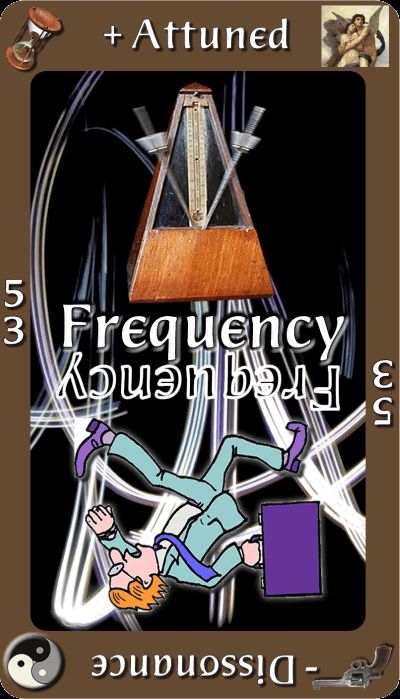53 Frequency

Are you the Tortoise or the Hare?
From Aesop’s Fable

Card messages in the Illuminated position.
+ Attuned
(in-sync, precision, frictionless, fluid, streamlined, harmony)
- When in-sync with one’s own pace, the feeling is ease, and one’s rhythm is attuned with rightness and efficiency. Your own in a groove! Take advantage of the endorphins while you can.
- Feel the hummmm? That is the sound of you in perfect high performance. All neurons are firing in-sync. Enjoy the ride.
- What might be gained by going faster? Or, slowing down for that matter? Your innate pace compels your gate, your speech, your rate of change. Are you in the groove with yourself? Are you functioning optimally?
- Crank-up or slow down. Find your rhythm again, work at your native pacing. More energy and success will come your way.
- Broaden your range to work at various rates of speed. Be like the sprinter who also runs marathons. You will be amazing!
- You are in a groove. Enjoy the ride.
- Work in your native rhythm. You are sure to have less friction and produce finer work.
- Everyone has a natural timing. Find yours. Let your thoughts, decisions and actions function at your optimal rate and confidence will begin to build as you stress less even about important topics.
Quotation Illustrating this concept…
- “Canada is a good country to be from. It has a gentler slower pace – it lends perspective.” Paul Anka
- Instinct taught me 20 years ago to pace a song or a concert performance. That translates into pacing a story, pleasing a reading audience. Jimmy Buffett
- It generally happens that assurance keeps an even pace with ability. Samuel Johnson
Card messages in the Shadow position.
– Dissonance or Strained
(disharmony, sluggish, frazzled, shrill, erratic)
- When marching to the beat of someone else’s tune it is easy to become un-synchronized, and experience dissonance. What is keeping you out of step?
- When out-of-sync distortion reigns and a grating sense of dissonance prevails.
- Recalibration is called for. Take a walk and allow your natural rhythm to reemerge. Or, at the rate you are going, expect a crash, soon!
- Is your head spinning? Feeling ‘wiped-out’? Too much information is coming too fast. Slow it down or tune it out.
- Relationships can go awry when parties communicate or process at different rates of speed. Both of you notice the rate of speed you speak at, how much pause time between statements there is, and who reacts immediately and who processes a bit before responding. If you can notice these differences, your relationship might be able to adjust to a common ground.
- If you are having cognitive dissonance you are playing the wrong chords. Your instrument was designed to play certain sounds in a specific tone. Check the tone of your voice or the one being spoken to you.
Quotation Illustrating this concept…
- “A lot of people run a race to see who is fastest. I run to see who has the most guts, who can punish himself into exhausting pace, and then at the end, punish himself even more.” Steve Prefontaine, World Class Runner
Relevance in the Michael Teaching
Frequency, in the Michael Teaching, refers to the natural pace or rhythm the Personality operates at, optimally. In other words, this  concept is not synonymous in anyway with the metaphysical notion of vibration. Nor is it in anyway referring how many time a person performs some task or how often.
concept is not synonymous in anyway with the metaphysical notion of vibration. Nor is it in anyway referring how many time a person performs some task or how often.
Frequency is measured and reported as being on a scale from 1 -100. Where 1 is bare movement and 100 would be someone who would not be able to sit still or to say a coherent sentence because of the speed of their verbiage. For Baby Boomers, many of you will fondly remember the old Federal Express (now FedEx) commercial spokesman, his name was John Moscitta who could speak almost 600 words per minute. This would be an example of 100 Frequency.
While not a part of the Overleaves perse, it is a very useful aspect about your Personality to know for this reason: energy management. In a physical body with processes like metabolism, respiration, digestion, and perspiration, all are regulatory features designed to assist in performance and prevent one from experiencing exhaustion. One might think of Frequency, in this context, as the volume to which the Overleaves are activated. In other words, at a high frequency or pacing, a person is libel to act with almost instantaneous or quick response patterns in speech, movement, and thought. At the other end of the scale, a person with low frequency will react more slowly, methodically, and with a tendency toward lethargy. (Don’t confuse this with laziness!)
When a person tries to modify their frequency the result is a sense of dissonance or feeling “out of sorts.” Frequency does tend to decline with age but only by a small percentage and more likely how often a person exhibits their high frequency. Essence and adaptation provide a mechanism for consciously altering the rate of frequency in ways that a person does not experience stress of being outside their comfort zone. It is called exercise. Whether Yoga to mellow the high frequency person or running to ramp up the low frequency person, the effect of both is to expand the range of function without damaging or draining the person.
The Frequency is chosen for a personality each life. Certain Overleaves themselves will enable or retard the pace as part of its natural composition. Passion and Aggression both do better or will at least “amp-up” frequency and correspondingly Stoic, Stubbornness, and Caution will tend to dampen or dampen Frequency. But as with all Overleaves, the Essence loves seasoning a Personality with various ingredients in various amounts to sample all the combinations possible.
Famous Examples
High: Fed Ex guy, Robin Williams, Road Runner,
Low: Buddha, Alfred Hitchcock,
Cultural Meaning
Frequency becomes an integral part of our understanding of meaning. Low frequency will tend to ponder a bit even if a thought expressed seems self evident. This is getting to be a lost art. In the land of instant feedback and immediate gratification, it is perceived that the quicker is better. What it is however, is often rash.
Having referenced Aesop’s fable of the Tortoise and the Hare – the comparison is a reasonable and simply understood analogy. Like the hare in the story, who sprinted in segments and rested often along the race, this pattern of spurts of energy output tend to be common rather than someone who is “up” all the time. However, in the case of some people at this rate, when they tire, they are burnt! The tortoise is a more moderated and measured animal and does not, and really cannot hurry. Thus, people in lower range might need a head start on getting ready to go somewhere. Again, low frequency does not mean disorganized or stupid, or dim-witted. That is an American stereotypical imprint. This culture is fixated on immediacy and quickness. It often shows and proves to be detrimental though. The advantage of the low frequency is that of deliberation, might like Caution but without the fear of distrust, just merely a lower CPU speed. Comparisons between the two ranges are not in quality but merely in speed. Super computers may be able to calculate an mathematical problem at near the speed of light. But someone using an old, manual slide rule, with the same knowledge base, will come up with the exact same answer, just a few seconds behind.
How to measure your natural pace….
- If you jump out of bed in the morning, you are higher paced.
- If people tell you to slow down so that they can keep up with what you are saying, you are higher paced.
- If your pace is high, when waiting for an elevator, you are likely looking around, shifting weight from side-to-side, or saying “come-on, come-on”.
- If your pace is lower, it may take you a moment to respond to someone who has asked you a question. As if it were “tape delay.”
- Pausing is a common marker of the lower frequency person. Giving them time to collect themselves and respond.
- As a high frequency person, I might lose my train of thought because I am thinking of so many things at once.
